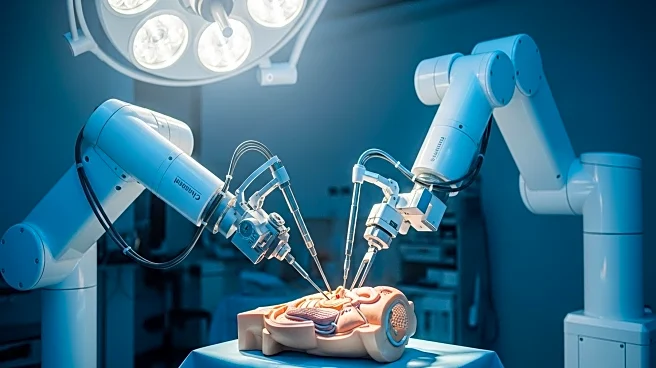What's Happening?
EndoQuest Robotics Inc. has announced the successful completion of a robotic endoscopic submucosal dissection (ESD) procedure at the Mayo Clinic, as part of its Prospective Assessment of a Robotic Assisted Device in Gastrointestinal Medicine (PARADIGM) Trial. Dr. Norio Fukami, a professor of medicine and director of Therapeutic Endoscopy at Mayo Clinic in Arizona, performed the procedure using EndoQuest's Endoluminal Surgical System. The trial aims to evaluate the system's effectiveness in lower gastrointestinal tract procedures. The ESD procedure involved the removal of a complex colorectal lesion, demonstrating the system's capability to simplify traditionally challenging procedures. The device is part of an FDA Investigational Device Exemption pivotal trial, and EndoQuest plans to continue the trial across five leading U.S. healthcare institutions.
Why It's Important?
The successful robotic ESD procedure marks a significant advancement in gastrointestinal medicine, potentially reducing the need for invasive surgeries like colectomies. This development could lead to improved patient outcomes and reduced recovery times. The technology offers a 'second hand' for surgeons, making complex procedures more natural and reproducible, which could lower the burden on both patients and physicians. As therapeutic endoscopy grows rapidly, with a significant increase in advanced endoscopy fellowship programs, EndoQuest's technology is positioned to drive a shift towards organ-sparing care. The PARADIGM Trial's success could lead to FDA approval and commercialization of the Endoluminal Surgical System, impacting the future of GI treatments.
What's Next?
EndoQuest Robotics plans to enroll 50 subjects across five U.S. healthcare institutions for the PARADIGM Trial. Upon completion, the company intends to submit a De Novo request for FDA authorization to market the Endoluminal Surgical System in the U.S. The trial's outcomes could influence the adoption of robotic-assisted procedures in gastrointestinal medicine, potentially setting new standards for treatment. Additionally, EndoQuest's recent Series D-2 funding round will support the advancement of its surgical platform, furthering the development and potential commercialization of the technology.
Beyond the Headlines
The introduction of robotic-assisted procedures in gastrointestinal medicine raises ethical and training considerations. As the technology becomes more prevalent, there will be a need for comprehensive training programs to ensure surgeons can effectively utilize these advanced systems. Additionally, the shift towards less invasive procedures may impact healthcare costs and accessibility, potentially leading to broader discussions on healthcare policy and insurance coverage for robotic-assisted treatments.









